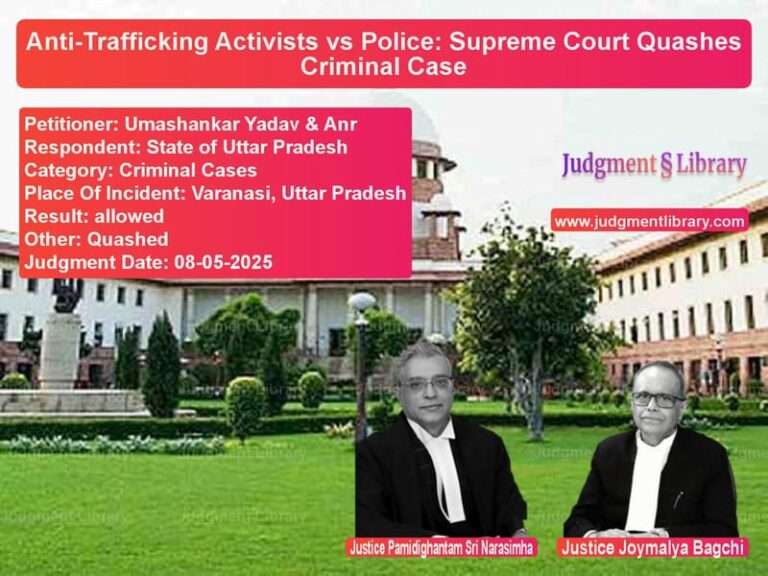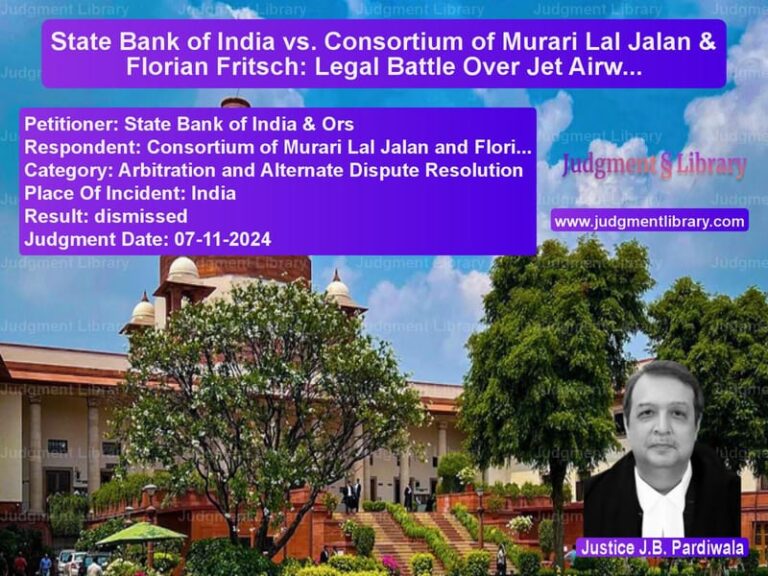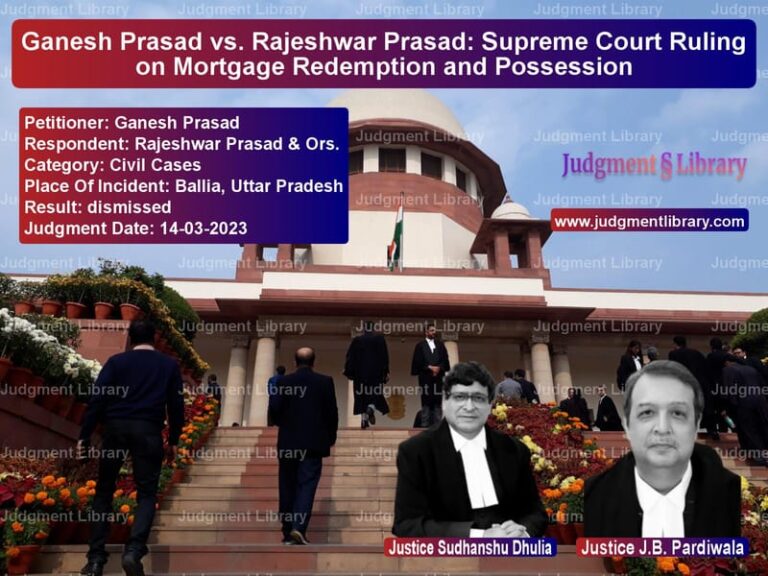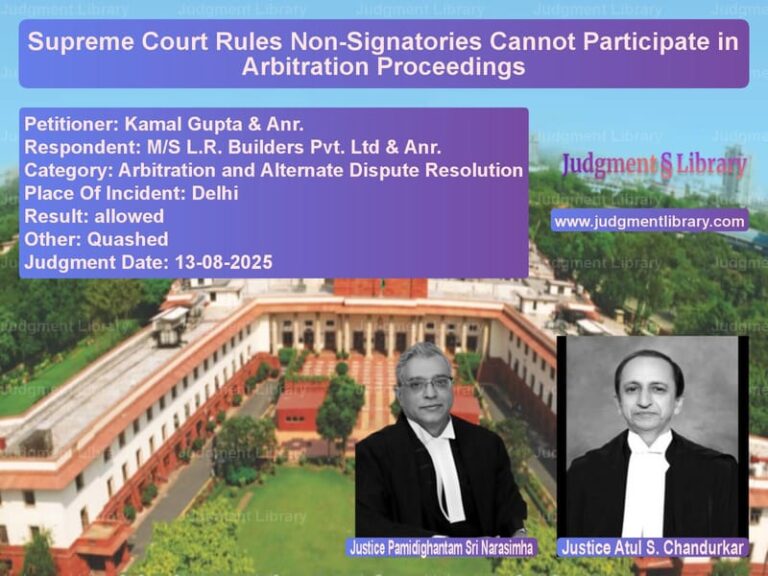Tenant Rights and Heirship: Supreme Court’s Decision on Unauthorized Occupation in Eviction Dispute
The Supreme Court of India, in its judgment dated February 7, 2017, ruled in the case of Durga Prasad vs. Narayan Ramchandani (D) Through LRs, addressing a crucial question regarding the rights of legal heirs in tenancy matters under the Uttar Pradesh Urban Buildings (Regulation of Letting, Rent, and Eviction) Act, 1972. The Court held that the brother of a deceased tenant does not automatically qualify as an heir or a legal tenant under the Act unless he meets specific legal conditions.
The case highlights the legal principles governing the inheritance of tenancy rights and provides clarity on the eligibility of family members to succeed tenancy under the U.P. Act XIII of 1972. The Court ruled that the appellant was an unauthorized occupant and ordered his eviction.
Background of the Case
The property in question was located at 6/7, Amrit Kaur Road, (New Road), Dehradun. The tenancy of this property originally belonged to Hem Ram Sharma, who had taken the premises on rent. After his death, his son, Baldev, inherited the tenancy, and after Baldev’s death, his wife, Lalita Devi, became the tenant.
During the pendency of the eviction proceedings initiated by the landlord, Lalita Devi passed away on July 6, 2013. The appellant, Durga Prasad, who was Lalita’s brother, claimed to be her legal heir and sought to continue occupying the premises.
Landlord’s Eviction Petition
The landlord, Narayan Ramchandani, filed an eviction petition under Section 21(1)(a) of the U.P. Act XIII of 1972, claiming bona fide need of the premises. He contended that:
- The appellant was not a legal heir of Lalita Devi and had no right to inherit the tenancy.
- The tenancy, being originally in the name of Lalita’s husband’s family, could only pass to the heirs of the husband as per Section 15(2)(b) of the Hindu Succession Act.
- The appellant had no legal standing to claim tenancy and was an unauthorized occupant.
Tenant’s Defense
Durga Prasad, the appellant, argued that:
- He had been residing in the premises along with Lalita Devi and was involved in her business.
- Since he had been occupying the premises with Lalita, he should be considered as her legal heir.
- The landlord himself had filed an application for substitution, acknowledging him as the legal heir of Lalita Devi.
Decisions of Lower Courts
The eviction petition was initially dismissed by the Prescribed Authority on April 19, 2010. However, the landlord appealed before the Additional District Judge-VII, Dehradun, who ruled in favor of the landlord on October 10, 2014, holding that:
- Durga Prasad was not a legal heir under Section 3(a) of the U.P. Act XIII of 1972.
- He did not fall within the definition of ‘family’ under Section 3(g) of the Act.
- He had failed to prove that he normally resided with Lalita at the time of her death.
The appellant then challenged this order before the Uttarakhand High Court, which dismissed his writ petition on March 9, 2015, affirming the eviction order.
Supreme Court’s Ruling
The Supreme Court upheld the eviction order and ruled that:
- Durga Prasad was not a legal heir of Lalita Devi under tenancy laws.
- The tenancy would devolve only to the heirs of Lalita’s husband, as per Section 15(2)(b) of the Hindu Succession Act.
- The appellant did not qualify as ‘family’ under Section 3(g) of the U.P. Act XIII of 1972.
The Court observed:
“The words ‘normally residing with him’ suggest that only those heirs who resided with the tenant in the normal course and not temporarily would inherit the tenancy rights. The legislative intent is clear that mere occasional residence with the tenant does not establish a legal tenancy claim.”
Conclusion
The Supreme Court dismissed the appeal and directed the appellant to vacate the premises within four weeks. The ruling clarifies that:
- Tenancy inheritance follows specific legal provisions under the Hindu Succession Act and the U.P. Rent Control Act.
- Mere residence in a tenanted property does not confer legal tenancy rights.
- Unauthorized occupants have no legal protection under rent control laws.
This judgment serves as an important precedent in landlord-tenant disputes, reinforcing that tenancy rights are not automatically transferable to all family members but only to legally recognized heirs.
Don’t miss out on the full details! Download the complete judgment in PDF format below and gain valuable insights instantly!
Download Judgment: Durga Prasad vs Narayan Ramchandani Supreme Court of India Judgment Dated 07-02-2017.pdf
Direct Downlaod Judgment: Direct downlaod this Judgment
See all petitions in Property Disputes
See all petitions in Landlord-Tenant Disputes
See all petitions in Succession and Wills
See all petitions in Judgment by Dipak Misra
See all petitions in Judgment by R. Banumathi
See all petitions in dismissed
See all petitions in Remanded
See all petitions in supreme court of India judgments February 2017
See all petitions in 2017 judgments
See all posts in Civil Cases Category
See all allowed petitions in Civil Cases Category
See all Dismissed petitions in Civil Cases Category
See all partially allowed petitions in Civil Cases Category







